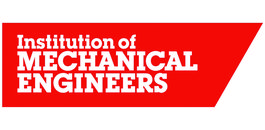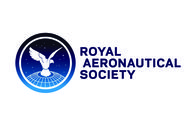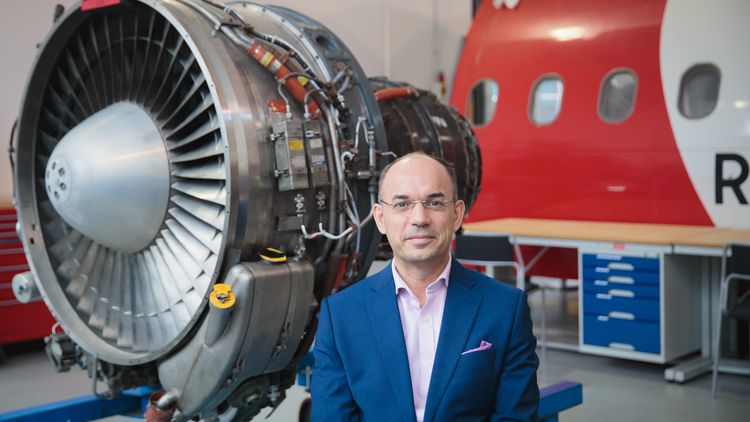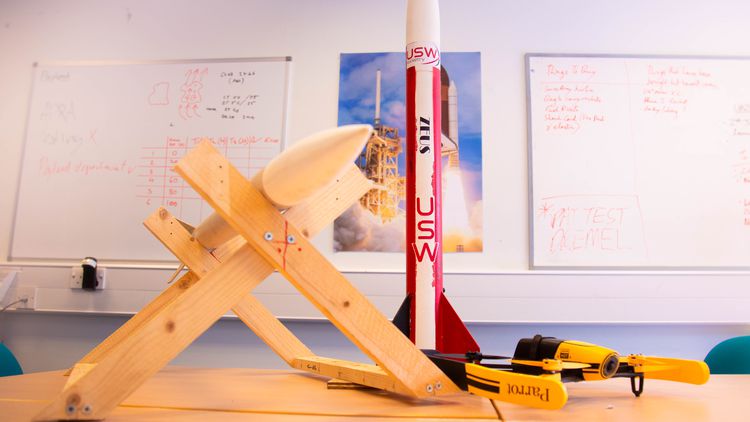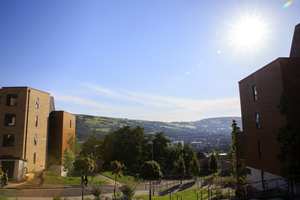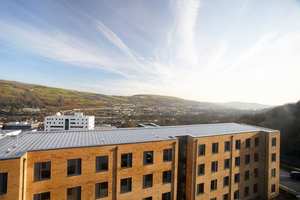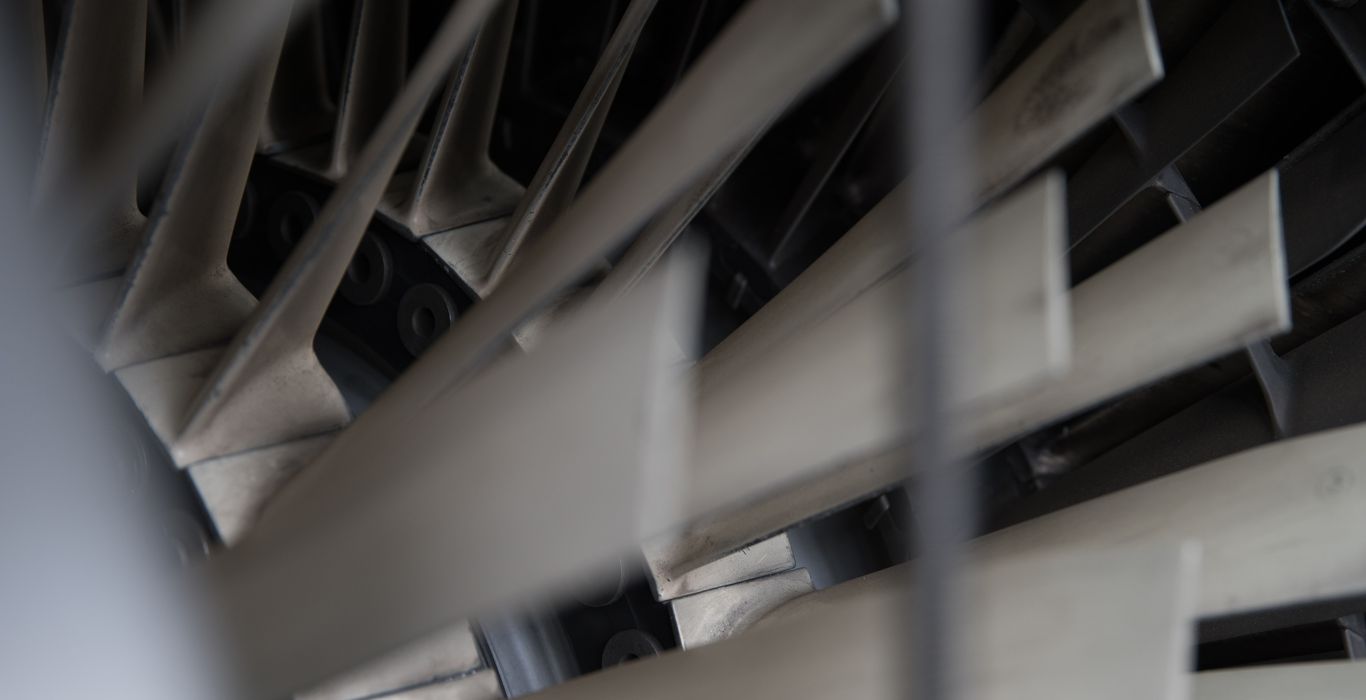
MSc Aeronautical Engineering
Aeronautical engineering graduates are highly valued and in great demand. The Aeronautical Engineering masters is ideal for graduates seeking employment in the aeronautical sector and for practising aerospace engineers who want to extend and update their skills.
Progression to management is key to the careers of postgraduate engineers, so as part of the aeronautical engineering programme you will develop relevant managerial skills, as well as an awareness of the wider issues that affect the aeronautical industry.
The MSc Aeronautical Engineering meets the academic requirements for Chartered Engineer (CEng) status with the Institution of Mechanical Engineering (IMechE) and the Royal Aeronautical Society (RAeS).
Throughout the MSc Aeronautical Engineering programme, you will study a mix of core and optional modules and undertake a supervised 60 credit dissertation. Please note: If you’re an aeronautical engineering graduate from the University of South Wales intending to progress into postgraduate study, you will be required to complete the optional modules in advanced materials and manufacture, advanced computational fluid dynamics, fatigue and fracture and further FEA.
- Advanced Materials and Manufacture
This module will enable the student to gain knowledge and analytical skills on a range of modern engineering materials, subsequently develop a critical awareness on the selection criteria for aeronautical and mechanical engineering applications. You will also develop knowledge on a range of manufacturing processes, methods and techniques. - Fatigue and Fracture
The aim of this module is to enable students to carry out appropriate analysis to apply to designs where failure due to fatigue may be an issue. The analysis of cracks in structures allows the students to make informed decisions as to appropriate actions that can be taken to prevent unwanted catastrophic failure. - Further Finite Element Analysis
This will enable the student to assess the suitability of finite element analysis to solve a range of engineering analysis with an understanding of the limitations of the analysis. You will learn how to carry out appropriate finite element analysis using a range of modelling techniques and to critically analyse the results obtained from finite element software. - Further Computational Fluid Dynamics
This will provide students with a practical understanding of the numerical methods which underlie computational fluid dynamics analysis. - Research Methods for Engineers
This will provide the students with the ability to determine the most appropriate methods to collect, analyse and interpret information relevant to an area of engineering research. You will develop the ability to critically reflect on your own and others' work. - Aeroelasticity
This module provides the student with an integrated understanding of the interaction among aerodynamic, inertia and elastic forces and how this interaction affects the design of an aircraft. You will learn how to predict, analyse and assess aeroelastic phenomena on an aircraft. - Professional Engineering Management
This module will enable learners to develop knowledge of strategic leadership within the context of an engineering business. Learners will develop the skills to critically analyse leadership and management theories and how these shape the strategic direction and effectiveness of an organisation. The learners will develop understanding of application of this knowledge to individual leadership skills in relation to professional engineering, using the Engineering Council UK-Spec document as a framework for good practice.
- Advanced Propulsion
This will provide the skills required to perform detail analysis of components of aircraft engines. You will develop a working knowledge and critical awareness of aircraft engine performance, analysing techniques, component, system design and associated technologies - Advanced Aircraft Design
You will develop an integrated understanding of the taught aeronautical engineering postgraduate modules, through a design and synthesis perspective. This module will provide you with the tools and methods to conceptually create, simulate and optimise an aircraft design.
- Dissertation
The dissertation is the final component and the culmination of the MSc programme. The knowledge and skills of the taught elements of the MSc programe provide the foundation for this comprehensive research project along with additional guidance on research methodology. The dissertation represents a substantial piece of work, which brings the taught elements of the programme into context within a research or industrial based project work. The dissertation allows the students to undertake a substantial piece of investigative research work on an appropriate engineering topic and further develop the students skills in research, critical analysis and development of solutions using appropriate techniques
Direct Entry students with no prior knowledge of Computational Fluid Dynamics (CFD) or Finite Element Analysis (FEA) will also be given the option to enrol in the following modules:
- Engineering Computational Analysis - 20 credits
Teaching
The MSc Aeronautical Engineering is delivered evenly throughout the year.
Modules involve lectures, tutorials and practical laboratory work, with continually assessed coursework or a mixture of coursework and exams.
Assessment
You will be continually assessed through a mixture of coursework and exams. The dissertation allows you to research a specific aeronautical engineering topic, to illustrate your depth of knowledge, critical awareness and problem-solving skills.
The dissertation has three elements of assessment: a thesis, a poster presentation, and a viva voce examination.
Accreditations
The MSc Aeronautical Engineering course is accredited to Chartered Engineer (CEng) status by the Institution of Mechanical Engineers (IMechE) and the Royal Aeronautical Society (RAeS). For more information on the benefits of becoming a Chartered Engineer visit the Engineering Council.
Facilities
- Well-equipped computer rooms using state of the art (industry standard) design and analysis software. (SolidWorks, Ansys, FEA and CFD, LS-Dyna, etc) including the use of a cluster (Super computer) for high-speed computational work.
- Dedicated Project room.
- Wind tunnel.
- A laser cutter (plastics and wood). Used extensively for wing profile design and manufacture activities prior to use in wind tunnel.
- We also have composite making facilities, and wing profiles can also be manufactured using composite materials.
- Dedicated additive manufacturing facilities (3D printing), material testing facilities, non-destructive lab as well as a wide range of support laboratories and equipment for dissertation projects.
- Final year projects can use the technical support in our well-equipped engineering workshops, facilities include CNC machining, lathes and milling machines, drills, etc.
Lecturers
We regularly revalidate courses for quality assurance and enhancement
At USW, we regularly review our courses in response to changing patterns of employment and skills demand to ensure we offer learning designed to reflect today’s student needs and tomorrow’s employer demands.
If during a review process course content is significantly changed, we’ll write to inform you and talk you through the changes for the coming year. But whatever the outcome, we aim to equip our students with the skillset and the mindset to succeed whatever tomorrow may bring. Your future, future-proofed.
A minimum 2:2 Honours degree in aeronautical or aerospace engineering, although other applicants with a relevant engineering degree will be considered. The course welcomes international applicants and requires an English level of IELTS 6.0 with a minimum of 5.5 in each component or equivalent.
Full-time fees are per year. Part-time fees are per 20 credits. Once enrolled, the fee will remain at the same rate throughout the duration of your study on this course.
August 2023 - July 2024 Fees
Full-time UK: £9500
Full-time International: £15100
August 2024 - July 2025 Fees
Full-time UK: £10250
Full-time International: £16000
August 2025 - July 2026 Fees
Full-time UK: TBC
Full-time International: TBC
Student Perks
At the University of South Wales, you’re investing in so much more than a degree. We strive to provide our students with the best possible experience, no matter what you chose to study. Whether it’s access to top of the range mac books and PCs, state-of-the-art facilities packed with industry-leading equipment and software, masterclasses and events led by industry experts, or a wide range of clubs and societies to meet likeminded people, better tomorrows start with extra perks.
Each course also has their own unique student benefits to prepare you for the real word, and details of these can be found on our course pages. From global field trips, integrated work experience and free course-related resources, to funded initiatives, projects working with real employers, and opportunities for extra qualifications and accreditations - at USW your future, is future-proofed.
Click here to learn more about student perks at USW.
Additional Costs
As a student of USW, you’ll have access to lots of free resources to support your study and learning, such as textbooks, publications, online journals, laptops, and plenty of remote-access resources. Whilst in most cases these resources are more than sufficient in supporting you with completing your course, additional costs, both obligatory and optional, may be required or requested for the likes of travel, memberships, experience days, stationery, printing, or equipment.
Funding
Funding to help pay for (or cover) course tuition fees and living costs
Whilst you’re studying, you’ll have two main financial obligations – tuition fees and living costs. There’s lots of financial help available from the University of South Wales and external funding sources, that may provide loans (which have to be paid back) and grants, scholarships and bursaries (that don't).
To learn about course fees, funding options, and to see if you are eligible for financial support, visit our Fees and Funding pages.
USW Postgraduate 20% Alumni Discount 2023/24
The University of South Wales is offering a 20% reduction in tuition fees for all University of South Wales* graduates starting a taught/online*** MA,MSc, LLM,MBA or DBA course from September 2023 (this includes students starting a course in January/February 2024). T's and Cs apply. Click here for more details and eligibility criteria: USW Postgraduate Alumni Discount 2023/24
Apply directly to the University for this course.
Employment prospects are strong in this dynamic and diverse industry. Those with an Aeronautical Engineering university masters can enhance their career opportunities in commercial and military aircraft engineering, the air transportation industry, teaching or research. The highly technical nature of this course also equips you for careers in many related, technology-intensive fields.
Graduates are likely to progress to senior positions in the aeronautical engineering industry and related sectors. You may also consider an engineering research degree.


